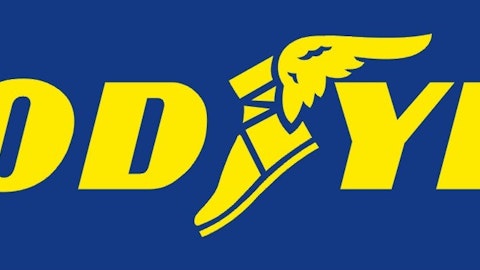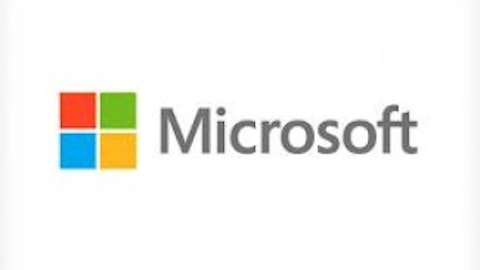Many investors in Microsoft Corporation (NASDAQ:MSFT) have loathed CEO Steve Ballmer, and the reason why seems to revolve around the stock price, which has fallen significantly since Ballmer took over the role of CEO from Bill Gates at the beginning of 2000. It seems that these investors have gotten their wish, because on Aug. 23, Ballmer announced that he would be retiring within 12 months. On that news, Microsoft stock shot up nearly 7.5%.
On the day that Ballmer made the announcement, CNN published an infographic showing what the stock price has done during the tenures of both Gates and Ballmer. It’s not a pretty picture.

Source: CNN Money
It’s not all Ballmer’s fault
If you bought Microsoft Corporation (NASDAQ:MSFT) stock at the beginning of 2000, you have done terribly, but you don’t have Ballmer to blame. In fiscal 2000, Microsoft earned a split-adjusted $0.85 per share, which put the stock trading at a peak P/E ratio of around 70. The stock crashed soon after this, and for the most part has remained stagnant since.
Ballmer did not cause the stock to do poorly. Had Bill Gates stayed on as CEO, the stock still would have crashed. No one could have stopped the stock from falling because the valuation had become completely ridiculous. The dot-com boom had pushed the share price up so high that a correction was inevitable. Shareholders were lucky the stock didn’t fall even further.
Since fiscal 2000, Microsoft Corporation (NASDAQ:MSFT) has grown both its revenue and its earnings per share by more than a factor of three. During this time, the company has also added $53 billion in cash to its balance sheet. To call Ballmer’s reign as CEO a failure ignores the company’s performance entirely. At its peak in 2000, Microsoft was valued at around $600 billion. Expecting market-cap growth from that number was downright insane.
Mistakes were made
Microsoft Corporation (NASDAQ:MSFT) has turned its Office and Windows divisions into cash cows, generating an incredible amount of cash each year. But the company missed the shift to mobile entirely, with Ballmer dismissing the original iPhone and letting Apple Inc. (NASDAQ:AAPL) and Google Inc (NASDAQ:GOOG) dominate the mobile market. Windows Phone 8, the first modern phone OS from Microsoft, came years after smartphones had become commonplace.
Tablets also took Microsoft Corporation (NASDAQ:MSFT) by surprise, although one could argue that it was Microsoft that pioneered the tablet form-factor to begin with. Back in 2001, Microsoft created the Microsoft Tablet PC specification for devices that would run Windows XP Tablet Edition and be operated via a stylus. These tablets never took off, largely because they were essentially a laptop computer crammed into a tablet. There was no easy-to-use touch interface, only support for a stylus on top of Windows XP.
When Apple Inc. (NASDAQ:AAPL) launched the iPad nearly a decade later, Microsoft had nothing to compete with it. It would take more than two years before Microsoft released Windows 8, its first truly touch-friendly OS. By then, iPads and Android tablets were selling in the tens of millions of units annually.
There were also successes
Even though Microsoft missed some huge trends, there were a litany of triumphs. The Xbox game console, and later the Xbox 360, entered a market dominated by Sony and won significant market share. Worldwide, the Xbox 360 and PlayStation 3 have sold a nearly identical number of units since launch — about 78 million — and the Xbox One and PlayStation 4 will continue this battle in just a few months. The Xbox has given Microsoft entry into the living room, and the Xbox One will attempt to be both a game console and an all-in-one home entertainment solution when it launches in November.
Another success over the past decade is the diversification that has taken place. Although Office still represents a big chunk of Microsoft’s profits, there are plenty of fast-growing businesses within the company. Microsoft now has 16 businesses that generate over $1 billion in revenue annually, including Windows Server, Xbox, SQL Server, Dynamics, Windows Azure, and cloud-based Office 365.
Although Microsoft seems irrelevant to many on the consumer side, the company dominates enterprise. Most of the company’s profits come from businesses and not consumers, and the enormous market share of Windows and Office among enterprise users is unlikely to change any time soon.
Windows Phone, which has a very small market share in the U.S., is actually doing quite well in certain markets. In Latin America, Windows Phone is now the No. 2 phone operating system, overtaking iOS. This is a huge development for Microsoft, and I suspect that eventually Windows Phone will be No. 2 worldwide.
An interesting twist in the mobile phone market, another Microsoft success, is the royalty income the company generates from sales of Android devices. Google Inc (NASDAQ:GOOG), at least according to Microsoft, violated various patents when creating Android, and instead of Microsoft suing Google Inc (NASDAQ:GOOG), it has signed royalty deals with the smartphone manufacturers that use Android. Although the exact figures aren’t reported by Microsoft, it’s estimated that the company receives as much as $8 per Android device. With deals signed covering 80% of the U.S. Android phone market, Microsoft could generate hundreds of millions or even billions of dollars this year from Android royalties.
This is an interesting situation because it puts a cost on using the free Android operating system. With Microsoft charging a fee to use its Windows Phone OS, these royalties put the two operating systems on more equal footing, possibly enabling low-cost Windows phones to be comparable in price with low-cost Android phones.
The bottom line
Ballmer took the CEO job at a time when a steep fall in the stock price was basically guaranteed. Mistakes were certainly made, but Microsoft is a far larger and more profitable company today because of Ballmer. There are plenty of successes to go with the failures, and with Microsoft more diversified than ever, the future looks bright.
The article Why Steve Ballmer Is Not a Failure originally appeared on Fool.com and is written by Timothy Green.
Timothy Green owns shares of Microsoft. The Motley Fool recommends Google. The Motley Fool owns shares of Google and Microsoft.
Copyright © 1995 – 2013 The Motley Fool, LLC. All rights reserved. The Motley Fool has a disclosure policy.





